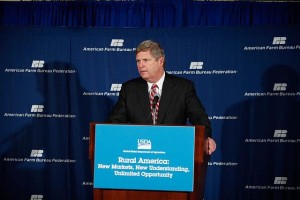

U.S. Secretary of Agriculture Tom Vilsack was speaking to the American Farm Bureau Federation Jan. 14 when he suggested agriculture needs to work with groups like the Humane Society of the United States.
The comment caught my attention when I saw it referenced first on Twitter. The Ohio Farm Bureau tweeted “Vilsack says egg farmers have right idea, referencing the common ground found through HSUS/UEP agreement.”
Vilsack says egg farmers have the right idea referencing the common ground found through the HSUS/UEP agreement #AFBF13
— Ohio Farm Bureau (@OhioFarmBureau) January 14, 2013
Isn’t that what we’re asking our Congress to do, work together to find a compromise, Vilsack continued. “I think the egg producers have the right idea.”
“… we need to be constructively engaged at all times and conversations. We may not find agreement. But I think we will substantially reduce those who oppose farming and substantially reduce the reach of those and hopefully be able to get enough proactive activity that results in a five-year bill.”
I’ll take an economist’s age-old option: On one hand, I agree; on the other hand, I disagree.
I wholeheartedly agree that agriculture needs to ramp up its outreach to the nonfarm world. I agree that proactive conversations with consumers and legislators can go a long way to building understanding and support of our world. And the two-way dialogue is important: Why should they have our back if we don’t try to understand their world, too?
We do need to sit at their tables.
I disagree, however, with Vilsack’s choice of the Humane Society of the United States as an example of a group we want as chums (unless it’s to heed the old adage: keep your friends close and your enemies closer).
I flat out don’t trust them.
No, I’m not trying to circle the wagons to protect existing farm practices that need to be revisited. Anyone who’s read this space with any regularity (here’s one example), knows that I will not be a cheerleader for practices that aren’t agriculturally accepted as humane, nor make excuses for the bad apples.
At the end of the day, the HSUS is still founded on and rooted in promoting a vegetarian diet. Period.
“… in the broadest sense, we must encourage people to eat lower on the food chain, for reasons of animal welfare, environment, resource conservation, human health and climate impacts,” wrote HSUS CEO Wayne Pacelle in his blog Oct. 22.
“… Americans simply don’t need to eat such a high volume of animal products,” continued Pacelle, who has been a vegan for more than 25 years. (Vegans are a type of vegetarians who don’t eat meat, eggs, dairy products and other animal-derived ingredients. Most also avoid using nonfood products made from animals, like leather or wool.)
The HSUS has a smooth, middle-of-the-road approach: Americans should be united in their compassion and responsibility to care for animals.
True. Can’t argue with that one.
People want to know where their food comes from, and how it is produced must be a part of that discussion, reminds Candace Croney, an animal scientist at Purdue University.
For livestock producers, it’s about doing things the right way for the animals that are providing your living — and then not being afraid or ashamed to talk about it. If you don’t, Pacelle will, while perfecting his corporate arm-twisting measures and moderate political maneuvering.
Yes, we need to sit at tables. Yes, we need to listen. Yes, we need to be more vocal and engage with consumers and elected officials. And, yes, maybe we even need to change practices.
But we don’t need to do it alongside someone who wants to put livestock farmers out of business.
Rep. Steve King, R-Iowa, said it best in an interview with longtime ag journalist Philip Brasher. “It comes down to, ‘Do we want the animal rights activists telling the food producers how to produce food?'”
By Susan Crowell












